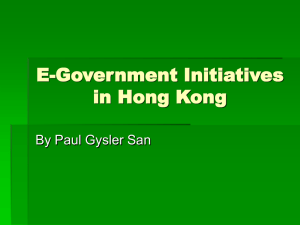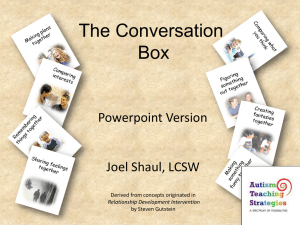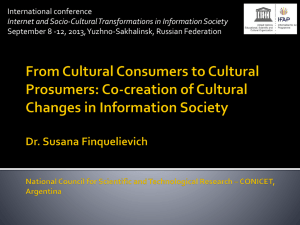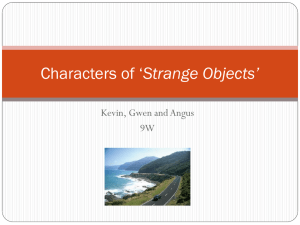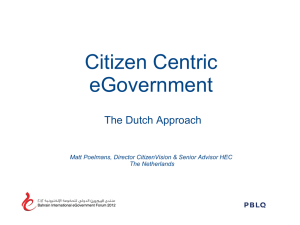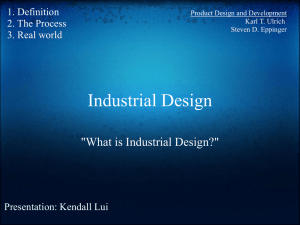Eye on the E-Citizen
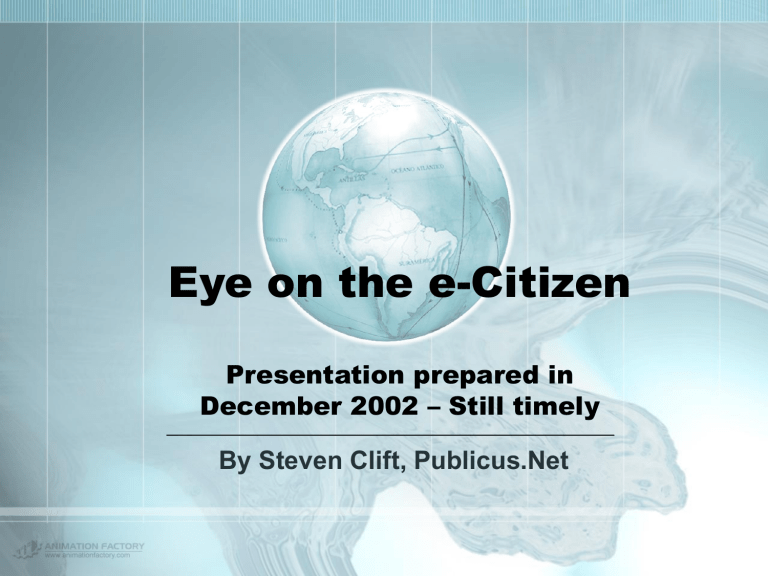
Eye on the e-Citizen
Presentation prepared in
December 2002 – Still timely
By Steven Clift, Publicus.Net
Eye on the e-Citizen
Presentation Outline
• Introduction
• Citizen Life
• E-reality
• Activating e-Citizens
• Conclusion
Eye on the e-Citizen
Copyright 2002, Steven Clift, Publicus.Net
Introduction
Introduction
• e-Citizen
October 20, 2012
• What do you envision?
Eye on the e-Citizen
Copyright 2002, Steven Clift, Publicus.Net
Introduction
• E-democracy is:
– the use information and communication technologies and strategies
Political
Organizations
– by “democratic sectors”
Government
– within the political processes of local communities, states, nations and on the global stage.
Media and
Commercial
Content
Private
Sector
Eye on the e-Citizen
Copyright 2002, Steven Clift, Publicus.Net
Introduction
• E-democracy:
– is now, what kind is it?
– is accelerating “as is” politics
Political
Organizations
– will promote active citizen participation
Government and the public interest only if the
“e-citizen” perspective is understood and built upon
E-Citizens
Media and
Commercial
Content
Private
Sector
Eye on the e-Citizen
Copyright 2002, Steven Clift, Publicus.Net
Introduction
•
E-democracy should seek to:
– improve the democratic outcomes of the policy/political process
– engage citizens directly in meeting public challenges
•
Involvement for the sake of involvement has limited value.
•
E-democracy must make a qualitative difference.
Eye on the e-Citizen
Copyright 2002, Steven Clift, Publicus.Net
Introduction
•
Questions to consider …
•
What does the e-citizen:
– experience?
– think?
– say they want?
– really do online?
•
How can we best use online tools and strategies to achieve better public outcomes?
Eye on the e-Citizen
Copyright 2002, Steven Clift, Publicus.Net
Citizen Life
Citizen Life
•
Time – People are busy.
– Time use studies provide valuable insights.
– Civic activities account for a small portion of time.
– The United States is starting one now .
– Most studies have found that Internet use displaces time spent with mass media.
– Information and interactivity can reach people at different places through different technologies and channels.
Eye on the e-Citizen
Copyright 2002, Steven Clift, Publicus.Net
Citizen Life
•
Confidence and Trust – Not much?
– The public is less confident in itself than our leaders.
How much confidence do you have in the public as a whole when it comes to making judgments about what general direction elected and government officials should take on various issues facing the nation?
Source: Public Perspective
– Government by the People
, Kaiser Family Fund survey released
March 30, 2001
– Trust in government low – 69% trust it to handle national security, only 38% trust it to handle domestic social issues, 61% sometimes/never
Source: ABC News, January 2002 in Public Perspectives July/Aug 2002
Eye on the e-Citizen
Copyright 2002, Steven Clift, Publicus.Net
Citizen Life
• Voting – Sometimes.
– In 2002, ~39% of eligible voters voted
• Record lows in CA 31.5%, AZ 27%, IN 34%, etc.
• National highs MN 61.4%, SD 61.3%, ME 50.6%
Source: Committee for the Study of the American Electorate
– In 2000, 50% of eligible voters voted, citizen response:
• Democratic system is strong and working well: 25%
• Democratic system not strong and not working well: 67%
Source: NBC News/Wall Street Journal, Dec 7-10, 2000
– Young voters (18-24)?
• 16% voted in 1998 mid-term election ( Census Bureau )
• 13% predicted in 2002 (no exit polls) ( Press report )
• UK YVote?YNot report : If not sure how, 76% would ask parents how to vote, 9 % at polling station, 5% a friend
Eye on the e-Citizen
Copyright 2002, Steven Clift, Publicus.Net
Citizen Life
• Influence -
– 68% of the public feels the views of the majority should influence government decisions “a great deal,” 26% a fair amount
– 9% feel the majority actually has a great deal of influence, 41% a fair amount
– Disconnect - Policy leaders and media see the public having a much greater impact than the public sees
– Disconnect 2 – Public underestimates influence of lobbyists and special interests as well as the influence they have when they contact government/elective leaders
– Disconnect 3 – The public wants campaign contributors and journalists to have less influence than others
Source: Public Perspective – Government by the People , Kaiser Family Fund survey released March 30, 2001
Eye on the e-Citizen
Copyright 2002, Steven Clift, Publicus.Net
Citizen Life
• Connecting - Civic things we want.
– The “best ways for officials to learn what a majority of people in our country think about important issues.”
Source: Kaiser
– “Very important” Campaign conduct
• candidates agreeing to participate in forums where the public can question candidates directly – 75%
• agreeing to participate in public debates - 71%
• disclosing campaign finances in the Internet - 44%
•
Source: Public Perspectives, Nov/Dec 2002
Eye on the e-Citizen
Copyright 2002, Steven Clift, Publicus.Net
Citizen Life
•
Citizen Categories
– 1. Active
• Always vote
• Belong to civic groups
• Attend public meetings
• Write to public officials
•
Donate to campaigns/causes
– 2. Informed
• Read newspapers, watch/listen to news
• Feel informed, sometimes act
• Normally vote
– 3. Passive
• Watch TV news sometimes
• Sometimes vote
• Turned off by politics
– 4. Disengaged
• Tuned out, news?
• Don’t vote
• Often young
Eye on the e-Citizen
Copyright 2002, Steven Clift, Publicus.Net
Citizen Life
•
Making a difference – Questions to ask
– What encourages citizens to get involved? To change their normal routine?
– What makes involvement an empowering experience? What frustrates people?
– What forms of participation can compete for attention? What about online forms?
– What strategies work better with different types of citizens? How do we complement what we know works with online assistance?
Eye on the e-Citizen
Copyright 2002, Steven Clift, Publicus.Net
e-Reality
e-Reality
• American adults online – Slow growth?
– Percentage of adults online in the U.S. – 59%
– Percentage of those online who went online yesterday – 57% (or
34% of all adults or 64 million people)
– Online at home? 43% yesterday, 45% not yesterday,
12% don’t go online at home
– Online at work? 25% yesterday, 25% not yesterday,
50% don’t go online from work
– Numbers holding steady over last year.
Source: Pew Internet Oct 2002 Survey
–
Affluent population drives current Internet user growth 11-20%, households under $50,000/yr less than 5%
Source: Neilsen/NetRatings
• Population % online varies by state:
– Top: AK 68.8, MN 63.5, NH 63.5, WY 62.3, MD 61.4
– Lower: CA 52.1, TX 51.2 … AL, AK, LA, MI 46.2 – 41.8
Source: 2002 State New Economy Index, using government NTIA 2001 data
Eye on the e-Citizen
Copyright 2002, Steven Clift, Publicus.Net
e-Reality
• Time on the web, average each month
– Home
• 12:07 hours
• visit 49 sites
• 23 sessions
• 55 seconds a page
– Work
•
31:08 hours
• visit 95 sites
• 56 sessions
•
61 seconds a page
Source: Neilsen/NetRatings October 2002
• Broadband (BB) provides “always-on” convenience
– As of Jan. 2002, 1/2 time online from BB users, only 21% of athome online pop. (not households) have BB in U.S..
Source: Neilsen/NetRatings
– South Korea, 95% of users have BB ~$28 month and spend
16:17 hours online each month
Source: ACNeilsen eRatings
Eye on the e-Citizen
Copyright 2002, Steven Clift, Publicus.Net
e-Reality
• Where oh where online – From home, Oct. 2002
Source: Neilsen/Netratings
Eye on the e-Citizen
Copyright 2002, Steven Clift, Publicus.Net
U.S. Government ranks #4 from work.
Wasn’t measured until this year.
e-Reality
• E-mail is king
– Top three web properties include e-mail centric uses.
– Pew Internet - Of adult Internet users each day:
• 50% send/read e-mail, 93% have ever
•
29% use search engine, 85% have ever
•
3% buy a product, 61% have ever
• 5% download music files, 32% have ever
– Opt-in E-mail newsletters are hot, click-through range from
9.5% by catalog companies to 4.4% for the hospitality industry,
Source: DoubleClick
– Web banner ad click-through often under 0.5%
• E-mail strengthens private connections among family and friends. What about “public life?”
– Online groups offer opportunity – 84% of Net users have used the net to contact or get information from a group. 79% of them stay in regular online contact
Source: Pew Internet, Online Communities
Eye on the e-Citizen
Copyright 2002, Steven Clift, Publicus.Net
e-Reality
• Getting Informed
– According to Markle Foundation Internet Acct. Survey:
•
91% Internet users find the Internet informative
• Top benefits: 61% cite information/knowledge, 27% email/communication, 23% convenient/fast, 5% shopping
• Image: 45% library, 15% highway, 14% mall … 3% town hall
Source: Markle Foundation Internet Accountability Study Chapter 1
– More Pew Internet daily numbers:
•
26% Get news online on average day, 68% have ever
•
11% Look for political news/information, 45% have ever (rising)
• 9% Visit a government web site, 56% have ever
– Power Users access online newspapers
•
37% have broadband at home, three times more likely to have high speed office connection
• Readers are online almost twice the average 18:00 versus 10:00
• General users online 5-10pm when newspaper sites receive lowest use
•
48% sought local news past year
• 47% like e-mail best, 15% national/world news, 9% local news
• 13% interested in political news, (37% yes in their online survey)
Source: Power Users: Profile of Online Newspaper Consumers, May 2002
Eye on the e-Citizen
Copyright 2002, Steven Clift, Publicus.Net
e-Reality
• Trust. Online?
– 23% feel you can trust most things you read online
– 70% feel you have to question truthfulness of most things you read online
Source: Markle Internet Accountability Survey
• Trust. Credibility. Usability. Looks Matter.
– Net users trust Federal government more than web sites offering consumer advice, selling products
– Users say they want:
• 1. Easy to navigate sites
•
2. Ability to trust site information
• 3. Ability to identify information sources
• 4. Knowing site is updated frequently
•
5. Being able to find out important fact about a site
•
6. Knowing who owns the web site
– Credible sites must actually look good first except for nonprofit sites where identity of site operator was top concern
Source: Consumer WebWatch’s A Matter of Trust and How do People Evaluate a Web Site’s Credibility
Eye on the e-Citizen
Copyright 2002, Steven Clift, Publicus.Net
Activating e-Citizens
Activating e-Citizens
• Combining civic life with e-reality.
• Need to figure out what people say they want versus what they really do.
• In general, we need more survey research and analysis on strategic use of the Internet/ICTs to improve citizen participation, policy development, and governance between elections.
Eye on the e-Citizen
Copyright 2002, Steven Clift, Publicus.Net
Activating e-Citizens
• e-Citizens – Online campaigning, someone always wins/loses
– 2002 information on Internet role in elections emerging
•
Provider of election information to major sites reported 60% increase in traffic in 2002 -
Source: Capitol Advantage
• Politicalweb.info found that 64% of all candidates for U.S. House, U.S.
Senate, and Governor had their own web sites. Incumbents 75%, challengers 60%, third parties 45% -
Source: Politicalweb.info
– From the Institute for Politics Democracy and the Internet (fmr
Democracy Online Project) in 2000. Of internet users:
• 54% sent or received e-mail jokes about the candidates or campaign
•
39% sent or received e-mail about the election with friends or family
• 35% used the Net to get information about politics, campaigns, or issues – of this group, 40% felt Net important to deciding their vote
• 25% contacted or got information about political campaigns
•
10% contacted partisan interest groups
• 10% participated in live chat or web-based discussion
• 2% donated money to non-partisan organizations
•
1% donated money to political candidates
Source: Post-Election 2000 Survey on Internet Use for Civics and Politics
Eye on the e-Citizen
Copyright 2002, Steven Clift, Publicus.Net
Activating e-Citizens
• e-Citizens – E-Government and accountability
– E-Government must deliver democracy not just service. Survey says, most important benefit of e-government:
•
36% Government more accountable to citizens
• 23% Greater public access to information
• 21% More efficient/cost-effective government
•
13% More convenient government services
Source: Center for Excellence in Government, E-Government – The Next American Revolution, Sept 2000
– How can e-gov improve accountability – most important way?
•
29% allow citizens to communicate their opinions on major issues to officials quickly and easily
• 21% allow citizens to tell government agencies about info they need or problems they experience
• 21% give the public more info about the govt’s policies & decisions
• Also, 66% say that it is very or fairly important that e-government investments enable them to stay informed and voice their concerns and opinions to Congress
Source: Ctr. Excellence in Gov, e-Government to Connect, Protect, and Serve Us , Feb 2002
– 36% gov’t web sites users have high trust in government compared to 22% of those online with high trust who have not
Source: Center for Excellence in Government, January 2001 Supplemental Poll
Eye on the e-Citizen
Copyright 2002, Steven Clift, Publicus.Net
Activating e-Citizens
• e-Citizens – Elected Officials and E-mail
– Local elected officials use e-mail effectively
•
88% for their official duties, 61% daily
• 73% online officials say e-mail with constituents helps them better understand public opinion
•
56% improves relations with local groups
•
32% have been persuaded by e-mail campaigns on merit
• 21% e-mail lobbying campaigns opened eyes to strong opinions about which they were previously unaware
•
61% of online officials agree e-mail can facilitate public debate, but 38% say email alone can’t carry full debate on complex issues
Source: Pew Internet – Digital Town Hall, Oct. 2002
– Citizens in online groups provide foundation for two-way governance
• 13% often or sometimes email public officials
•
11% of Internet users say they are aware of at least one local issue where the net played a role in organizing citizens to communicate with public officials.
• Percentage doubles to 22% for Internet users who are active members of online communities.
Source: Pew Internet, Online Communities
– E-mail overload and spam a problem in U.S. Congress
Eye on the e-Citizen
Copyright 2002, Steven Clift, Publicus.Net
Activating e-Citizens
• What to do?
– Develop strategies that attempt to move citizens up one step
• 1. Active citizens
• 2. Informed citizens
• 3. Passive citizens
• 4. Disengaged citizens
– Most “e-democracy” projects sought multi-step improvements (shot for moon, got half-way) and did not meet overly optimistic expectations
– Develop support for democracy at each level with appropriate technologies and strategies
Eye on the e-Citizen
Copyright 2002, Steven Clift, Publicus.Net
Activating e-Citizens
•
Disengaged citizens
– Start early – develop online civic K-12 education components that establish expectations for Internet/ICTs use in society
– 18-30 – Find out where they really are online, what they do online and work to introduce tailored political information experiences within those sites
– Be realistic – the Internet is a medium that normally requires information seeking
– Study how low income/education groups use the Internet, purchase cheaper banner ad space for “civic” branding efforts?
Eye on the e-Citizen
Copyright 2002, Steven Clift, Publicus.Net
Activating e-Citizens
•
Passive Citizens
– Utilize “Tell a friend” and viral e-mail features.
– Create a site where parents/relatives can create an online voter/participation information
CARE package with “tracking” for senders
– Leverage e-government service transaction opportunities (online taxes, etc.) to introduce trust building information
– Partner with local news and entertainment sites to build awareness of civic news and opportunities, particularly volunteer listings
– Online polls are entry point activity
Eye on the e-Citizen
Copyright 2002, Steven Clift, Publicus.Net
Activating e-Citizens
• Informed Citizens
– MyBallot.Net 2004 et al
• Presidential primary offers tremendous early opportunity for
.org/media online participation efforts
•
Change the relationship between informed undecided/persuadable voters and the campaigns
– “Select a candidate/party” concepts highly popular, adapt for use between elections
– Online advocacy – share best practices, study ill effects, online efforts that improve things – avoid turning off informed citizens
– Develop online “constituent services” from elected officials
– Bring “public life” into e-mail communication through neighborhood and city/regional online groups – “the commons online”
Eye on the e-Citizen
Copyright 2002, Steven Clift, Publicus.Net
Activating e-Citizens
• Active citizens
– e-Citizen Portal – Create a trusted national network of local and state starting points for effective citizen participation – cannot be top-down
• Help the 1% who “show up,” including elected officials, interest groups, and activists improve public policy outcomes
•
Connect people and organizations solving public problems from the local level on up based on communities of practice/interest
– Hold “Online Town Halls” or consultations – primarily hosted by government and non-profits
– Extend the “Commons Online” up to statewide and national info exchange networks, connect to Congress
– Establish Government E-Democracy applications – including personalized meeting notices, and legislative issue tracking
Eye on the e-Citizen
Copyright 2002, Steven Clift, Publicus.Net
Conclusion
Conclusion
•
Measure and evaluate the right things
– Does it save the time it takes to become informed or sustain involvement?
– Does it increase the quality of the information available in desired formats and delivery channels?
– Does it enable society and government to effectively accommodate and incorporate higher levels of input and involvement?
– Does it build “public life,” strengthen trust among people and their government, or inspire us to believe that we can make a difference?
Eye on the e-Citizen
Copyright 2002, Steven Clift, Publicus.Net
Conclusion
•
The Internet and ICTs are accelerating “as is” politics.
•
We must intervene in the public interest based on our experience and knowledge.
•
It is time use the advantages of this new medium to improve people’s lives and the world around us.
Eye on the e-Citizen
Copyright 2002, Steven Clift, Publicus.Net
Further Information
• Democracies Online Newswire http://www.e-democracy.org/do
Over 2500 people around the world exchanging announcements, news, and articles related to e-democracy, e-government, and e-politics.
• E-Democracy Resources Flyer http://publicus.net/articles/edemresources.html
Links to the top e-democracy starting points on a two page flyer available in HTML, Word, and PDF.
• Publicus.Net http://www.publicus.net
More articles and presentations by Steven Clift
Eye on the e-Citizen
Copyright 2002, Steven Clift, Publicus.Net
